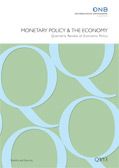Monetary Policy and the Economy Q2/15
 OeNB
OeNB
- published:
- June 2015.
 OeNB
OeNB
Four-year economic downturn to end in 2016 – Economic outlook for Austria from 2015 to 2017 (June 2015) (PDF, 754 kB) Ragacs, Vondra. Ragacs, Vondra – Monetary Policy and the Economy Q2/15 Jun 30, 2015, 12:00:00 AM
Financial literacy gaps of the Austrian population (PDF, 559 kB) Greimel-Fuhrmann, Silgoner, Weber. Silgoner, Greimel-Fuhrmann, Weber – Monetary Policy and the Economy Q2/15 Most people lack financial knowledge and have trouble dealing competently with their financial affairs, as evidenced by recent empirical research on financial literacy in various countries. We investigate financial literacy among Austrians based on a novel dataset covering about 2,000 persons. Our findings corroborate the existence of substantial knowledge gaps, which are most conspicuous among respondents with low educational attainment and low incomes, among younger and older people as well as women. We provide tentative evidence for a positive link between financial knowledge scores and financial behavior, such as setting aside rainy day funds or using several sources of information when choosing financial products. en financial literacy, financial education, central banks A20, D14 Jun 30, 2015, 12:00:00 AM
Implications of ultra-low interest rates for financial institutions’ asset liability management – a policy-oriented overview
(PDF, 912 kB)
Gnan.
Beer, Gnan – Monetary Policy and the Economy Q2/15
In a historical perspective, interest rates are currently very low. The further course of nominal and real interest rates crucially depends on how the macroeconomy will develop over the cycle and in a long-term structural perspective. In this contribution, we analyze how ultra-low interest rates affect financial institutions and their asset-liability management. In the short term, the impact depends on the relative duration of assets and liabilities. Hence, different financial institutions are affected differently depending on their balance sheet structures. Yet in the long term, the income of all types of financial institutions tends to suffer from ultra-low interest rates. A protracted period of (ultra-)low interest rates might compromise financial stability by eroding financial intermediaries’ capital; by amplifying the risk of bubbles and bursts; by heightening bond market volatility and its potential to trigger runs and fire sales in illiquid markets; and by causing risk positions to grow in the search for yield. Consequently, risks from a protracted period of ultra-low interest rates have been gaining attention from financial
regulators and supervisors. Adequate action requires an integrated view of monetary policy, macroprudential and microprudential regulation and supervision of various types of financial intermediaries including banks, institutional investors and shadow banks.
en
ultra-low interest rates, asset-liability management, financial institutions
E43, G2, G38
Jun 30, 2015, 12:00:00 AM